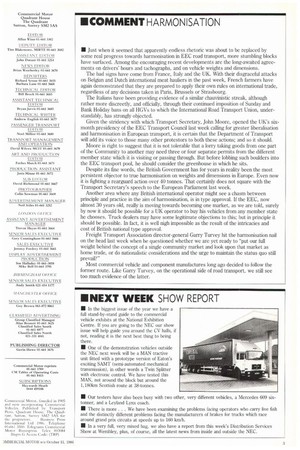• Just when it seemed that apparently endless rhetoric was
Page 5

If you've noticed an error in this article please click here to report it so we can fix it.
about to be replaced by some real progress towards harmonisation in EEC road transport, more stumbling blocks have surfaced. Among the encouraging recent developments are the long-awaited agreements on drivers' hours and tachographs, and on vehicle weights and dimensions.
The had signs have come from France, Italy and the UK. With their disgraceful attacks on Belgian and Dutch international meat hauliers in the past week, French farmers have again demonstrated that they are prepared to apply their own rules on international trade, regardless of any decisions taken in Paris, Brussels or Strasbourg.
The Italians have been providing evidence of a similar chauvinistic streak, although rather more discreetly, and officially, through their continued imposition of Sunday and Bank Holiday bans on all HGVs to which the International Road Transport Union, understandably, has strongly objected.
Given the stridency with which Transport Secretary, John Moore, opened the UK's sixmonth presidency of the EEC Transport Council last week calling for greater liberalisation and harmonisation in European transport, it is certain that the Department of Transport will add its voice to those many other protestors to both these actions; and so it should.
Moore is right to suggest that it is not tolerable that a lorry taking goods from one part of the Community to another may need three or four separate permits from the different member state which it is visiting or passing through. But before lobbing such boulders into the EEC transport pool, he should consider the greenhouse in which he sits.
Despite its fine words, the British Government has for years in reality been the most persistent objector to true harmonisation on weights and dimensions in Europe. Even now it is fighting a rearguard action over 40 tonnes. That certainly does not square with the Transport Secretary's speech to the European Parliament last week.
Another area where any British international operator might see a chasm between principle and practice in the aim of harmonisation, is in type approval. If the EEC, now almost 30 years old, really is moving towards becoming one market, as we are told, surely by now it should be possible for a UK operator to buy his vehicles from any member state he chooses. Truck dealers may have some legitimate objections to this; but in principle it should be possible. In fact, it is well nigh impossible as the result of the intricacies and cost of British national type approval.
Freight Transport Association director-general Garry Turvey hit the harmonisation nail on the head last week when he questioned whether we are yet ready to "put our full weight behind the concept of a single community market and look upon that market as home trade, or do nationalistic considerations and the urge to maintain the status quo still prevail?"
Most commercial vehicle and component manufactures long ago decided to follow the former route. Like Garry Turvey, on the operational side of road transport, we still see too much evidence of the latter.
























































































































